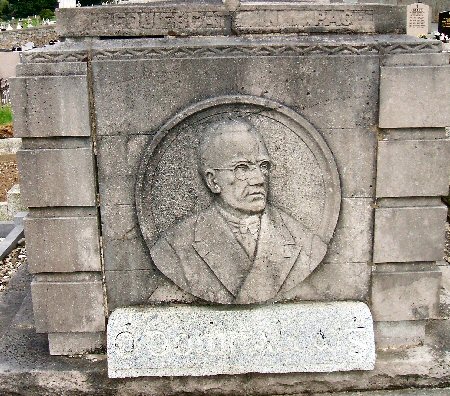On the 29th December 1944 a man by the name of Eamon Donnelly died. The Newry Reporter wrote of him on the 2nd January 1945:
‘A man who gave of himself willingly to the cause to which he bore allegiance even to the point of sacrifice, Mr. Donnelly throughout his life was an ardent supporter of the nationalist policy, though in recent years he set himself to follow the destinies of Sinn Fein, it being as he believed the more virile movement, the best through which he could serve the Irish nation.
Associated with many organisations throughout his active political life, he gave greatest assistance of all to the Green Cross Fund for the upkeep of dependents of internees, of which he was one of the prime movers and later general secretary.’
This is what the Newry Reporter said about his funeral:
‘At the funeral on Sunday to St. Mary’s Cemetery, deceased was accorded the greatest public tribute ever in the history of the town, when the highest ecclesiastical, governmental and municipal authorities in the land, north and south were represented, including the Bishops of Down and Connor, Dromore, and Clogher; An Taoiseach, Mr. Eamon de Valera, members of the Eire government, and members of the Dail and Northern Ireland House of Commons and Senate.’
Eamon Donnelly is buried in the family tomb, a few yards from the Republican plot in St. Mary’s Cemetery. But who was this man and why is so little known about him?
Eamon Donnelly was born in Middletown, Co. Armagh, in 1877. His mother was the daughter of a Fenian. All his life he was a passionate believer in Irish independence and in the early part of the 20th century he joined the emerging new party of Sinn Fein. He was a member of the Irish Volunteers and from 1916 onwards was instrumental in establishing their ideals throughout Armagh and Down. So great was his organizing powers that he was made director of elections for Sinn Fein. This culminated in Sinn Fein’s election landslide of 1918.
In 1921 he joined Eamonn De Velera’s anti-treaty forces and remained a critic of partition until his death. He was interned and on his release was appointed Chief Organiser of Sinn Fein.
In 1925, he stood for election in South Armagh as an abstentionist. He was elected with over 5,000 votes. He never took his seat and did not stand there again.
In 1926, he became a founder member of Fianna Fail, the party founded by his comrade Eamon de Velera. He unsuccessfully stood as a Fianna Fail candidate in Monaghan in 1927 and in the Leitrim-Sligo bye-election of 1929. In the general election of 1932, he was Director of Elections for Fianna Fail and it was his great work that helped them sweep to power. In 1933, he topped the poll when he was elected to the Dail in the Leix-Offaly constituency and remained its TD until his retirement in 1937.
Also in 1933, he spearheaded the election of Eamon de Valera to the Northern Ireland Parliament, representing South Down. De Valera received over 7,000 votes. Whilst attempting to make a speech in Newry, Donnelly was arrested under a Deportation Order served against him in 1925 and he served one month in Crumlin Road Jail.
In October 1935, in the ‘Motion to Establish a Republic’ in the Dail, Eamon Donnelly spoke against the motion. He said the words that meant so much to him all his life:
‘How could 26 counties out of 32 counties be a nation?’
The motion was defeated by 74 votes to 18.
In 1938, he was arrested again under the same Deportation Order, this time at his residence in Ballinacraig, Newry. He was charged at a special court in Belfast with defying an order excluding him from Northern Ireland. The Irish News reported his speech from the dock in which he stated that the exclusion order was 13 years old and had been issued in September 1925 and that punishment was being inflicted on him without his being given the right to defend himself. He went on:
‘It was delivered to me when I was coming from a lecture in Lurgan which was to have been addressed by Fr Michael O’Flanagan (the Sinn Fein priest). While supporting the candidature of the present prime minister of Eire (Mr de Valera) in South Down in 1933, I was arrested and brought to Belfast and got a month’s imprisonment. After that, I heard no more about it. I was born and raised in Ulster: my home is here: my wife and family reside here and I have a residence outside Newry. The time is approaching that some action must be taken to prevent my slinking into my house like a criminal.’
He was fined

1 thought on “Eamon Donnelly Remembered”